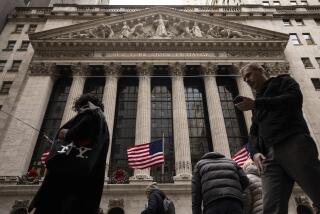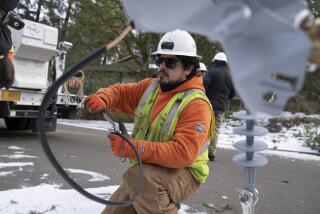Burst of Confidence: Economists Predict Growth for 3 Years
- Share via
WASHINGTON — The U.S. economy will continue to weaken next year but there will be neither a recession nor any substantial change in unemployment, the nation’s top business economists predicted today in a forecast their president said was the most enthusiastic ever.
The National Assn. of Business Economists said a survey of its members found 62% expecting no recession for the next three years.
“It’s a sea change,” said James F. Smith, NABE president and finance professor at the University of North Carolina. “We never ever had, not just a majority, but an overwhelming majority forecasting growth over three years.”
However, nearly 20% of the respondents said a recession will occur either by the end of the year or during the first three months of 1990, ending an unprecedented peacetime economic expansion that began its eighth year this month.
The new report was considerably more optimistic than last May’s survey, which found 63% of the economists expecting a recession next year. Three months later, 37% of the economists still forecast recession in 1990.
Smith said the last time the NABE survey correctly forecast a recession was in 1980, when it predicted the 1981-82 economic downturn. But he added that since 1983, the economists have been within one percentage point of forecasting the following year’s gross national product.
In the November survey, the consensus among the 59 respondents was that the gross national product--the nation’s total output of goods and services--would continue to grow slowly, dropping from the 2.9% forecast for 1989 to 1.8% next year.
The survey also showed an easing of inflation fears, with predictions that the consumer price index will fall from 4.8% forecast for 1989 to 4.2% next year.
At the same time, the economists expect interest rates will continue to fall, with rates on three-month Treasury bills dropping from 8.1% in 1989 to 7.1% in 1990. For 30-year Treasury bonds, the expected estimate is 7.8% next year, compared with 8.4% this year.
The economy has slowed considerably this year as the Federal Reserve boosted interest rates to restrain rising prices. But it began in June to gradually let rates fall as inflationary pressures moderated.
The manufacturing sector has been among the hardest hit by Fed actions, and the economists forecast continued weakness in industrial production.
But their report said “the slower overall growth and weaker industrial production is not expected to be reflected in higher unemployment.”
The survey suggested unemployment would rise only from 5.3% this year to 5.5% next year. That was down from the 5.8% predicted in their May survey and 5.7% in August.
The housing industry, hurt by higher interest rates earlier this year, is expected to improve modestly, with housing starts rising from 1.4 million in 1989 to 1.45 million in 1990, the economists said.
But they foresee no relief for the automobile industry, a third sector in the economic doldrums. Car and small-truck sales, they said, would drop from 15.1 million this year to 14.7 million in 1990.
More to Read
Inside the business of entertainment
The Wide Shot brings you news, analysis and insights on everything from streaming wars to production — and what it all means for the future.
You may occasionally receive promotional content from the Los Angeles Times.










